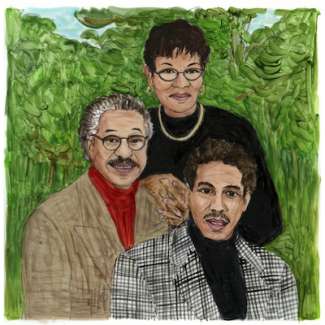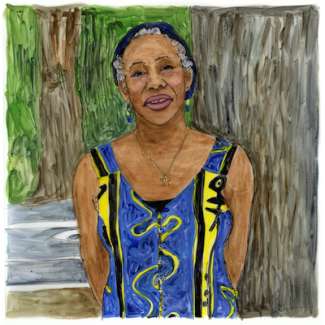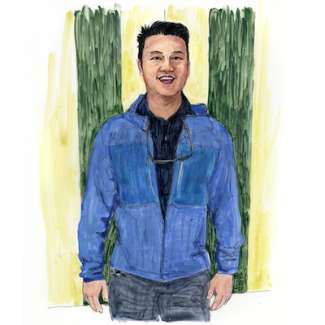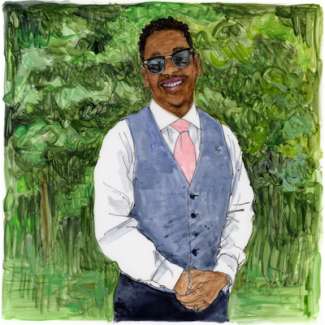Jump To:
The Camp Family
Norman and Betty Camp and their son, Norman IV, shared a passion for the environment, education and social justice. Dr. Norman and his wife, Betty played a key role in galvanizing the community to support the construction of Raleigh’s Walnut Creek Wetland Center and its nature education programs, the wetland gardens and other initiatives to alleviate flooding in Biltmore Hills and Rochester Heights.
Dr. Norman Camp, III, was an educator, environmentalist, political activist and community advocate. Born in East Raleigh, he grew up exploring the Walnut Creek area and graduated from Shaw University with a degree in Chemistry. His Ph.D. in Science Education prepared him well as he taught in public school systems, served as professor and academic dean at several colleges as well as being a Vice Chancellor. His educational mission led him into governmental service in the NC Department of Health and Human Services.
Mrs. Betty Camp, as well as Dr. Camp, were among the co-founders of the Autism Society of North Carolina, formed in 1970 by parents who wanted better lives for their children with autism. The Camp’s advocacy and leadership made better treatment and education accessible to autistic children across the state.
The Camp family, including their son, Norman IV, led and participated in the earliest Walnut Creek cleanups, rallying volunteers to walk the creek and clean up debris. They were joined by Trinity Episcopal Church in Fuquay-Varina and St. Paul’s Episcopal Church in Cary. Dr Camp, in conjunction with St Ambrose Episcopal Church, founded Partners for Environmental Justice, a grassroots organization in Southeast Raleigh that preserved Walnut Creek Wetlands for the benefit of the historically Black neighborhood surrounding it.
Dr. Camp chaired PEJ and served on boards including Audubon North Carolina. He and Betty played a key role in galvanizing support for the construction of Raleigh’s Walnut Creek Wetland Center and its nature education programs, wetland gardens, and other initiatives to alleviate flooding in Rochester Heights and Biltmore Hills.
On September 22, 2018, shortly after Dr. Camp’s passing, the Walnut Creek Wetland Center was renamed the Norman & Betty Camp Education Center at Walnut Creek Wetland Park.
Adrienne Chalmers
Adrienne Chalmers experienced flooding as part of growing up in Biltmore hills. She went on to work for Wake County Public Schools and is now the After School Director at Lee Brothers Martial Arts.
I grew up in an apartment in Biltmore Hills with my mother, who was a single mother, and my sister Karyn. I have been a member of St. Ambrose since I was about ten years old. My mom was a Baptist. My aunt played the piano organ at St. Ambrose and I started attending church with her. My mom was active in the church. She was president of ECW, Episcopal Church Women. She was the first Black Chancellor's Assistant at NC State, and the first Black secretary on NC State's campus. She was Employee of the Year before retiring from NC State in 1987.
I went to Fuller Elementary and when I got older, I attended Carnage Junior High. We had to walk down Garner Road to get to Carnage. When Garner Road flooded, we had to cut through the woods and run down a hill through people's backyards. One property at the bottom of the hill had a large German Shepherd, and you had to bounce off their chain link fence just right to avoid the dog. You had to develop some skills to get through there.
I am a retired Wake County Public School employee. I was an assistant, and then I moved to Longview School, which is an alternative school for students who have been displaced from public school. I was on the crisis team, I would watch over children who had been sent out of class, counsel them and try to get them to go back and be successful. It was very challenging, but I enjoyed the time that I spent there.
I retired from there after 14 years. I currently work at Lee Brothers Martial Arts, where I'm the after school director. Martial arts is not just for fun or beating up people. Martial arts helps kids learn to focus and concentrate, it teaches them a routine and self-control. They learn how to meditate and to focus their bodies as well as their minds. You can use it to defend yourself in a time when you need to defend yourself. That falls under self-control.
Back in the day, I was very athletic, I actually took martial arts myself. I made it to the belt just below Black Belt. Did you think I was just a little old lady piddling around?
Adrian Chamberlin
Adrian Chamberlin is a Recreation Leader at Walnut Creek Wetlands Park, and an instructor for Neighborhood Ecology Corps Year 1 Cohort.
I've been here for almost four years. I started as a student. I graduated from NC State in 2022 with my degree in Fisheries, Wildlife and Conservation Biology. I was born in Raleigh, and I've been hanging around ever since.
I was actually intending to go into Zoology because I knew I liked animals. But, I took a class my freshman year, taught by my now former advisor, which covered all sorts of Conservation topics, and she made it sound so interesting and involved. And then the following semester, I was able to do an elementary school science night event with my Entomology professor, and talk to them about bugs, and it was really fun.
Q: Do you think you want to do something that combines your environmental interest with education?
AC: I do. That's always been my goal, to have more of a diverse set of responsibilities.
Q: What's the most fun thing that you're doing with the First Years?
AC: I like the diversity of topics that we get to do, because we cover not only wildlife and then aquatic wildlife, we have a whole month dedicated to trees and soils and geology. So, there are things I'm super knowledgeable about, and things I'm less knowledgeable about. Then we do field trips and are able to apply all that knowledge.
This is what I want to do for the foreseeable future. I'm very happy here!
Tzu Chen
Tzu Chen is an architectural photographer and a licensed architect, who lent his skills to documenting the Raleigh Stories installations and Derrick Beasley’s artwork for WCWP. He also serves as a mentor to students interested in architecture, construction and engineering.
I went to school for Architecture, both my undergrad and my Master's. I started working in the industry for about 15 years, got licensed. I enjoyed my time as an architect, but my interest also was in photography. I started documenting my own projects. What really interested me in architecture was, was being able to tell a story to the client so that they can actually build the building. And most people won't be able to visit your building, so the story lives on through the documentation.
How do you tell the story through pictures? What are the most important shots, how can you tell the story in two images, of a project down that you worked on for two years?
I documented my own work, and we submitted some of the work to industry competitions, won some awards and people asked who the photographer was. It started from there.
Because of my background, I appreciate that a building didn't happen overnight. I think it’s important to be as authentic as possible. Some of the shots they will be “glamour shots,” because of how well the building is designed. But the shots that I find most interesting show the user actually using the building, how they interact, because really, the project is for them.
I also work for a nonprofit called ACE Mentor Program. Ace stands for Architecture, Construction and Engineering. We expose high school students to those fields, to learn skills from professionals that teach lessons on those disciplines. We choose a project that is a local issue or a problem that we try to solve. We put the students in teams and pair them up with mentors to design a project based on the prompts.
For example, we asked them to design a community rec center on the Carolina coast that doubles as an emergency shelter. They think about the community, the climate, and what we have to deal with in the future with hurricanes and storms.
The program is open to any high school student, so they could join as a freshman and then continue coming through senior year. They are able to network with professionals and understand the industry as a whole. It's not just the knowledge that you're gaining, but also how to work with people because no job is by yourself. Watch Tzu tell his story.
Charles Craig
Charles Craig is the Assistant Director of Raleigh Parks and Natural Resources Division: 10,000 park land acres/200 parks, 120 miles of greenway, 81 athletic fields and 96 playgrounds.
My love for the outdoors started as a kid. When I was growing up, I would stay with my grandparents for the summer. My grandparents had a farm with cows and pigs, chickens, a very amazing garden.
My grandfather is a third-grade dropout. However, he's the smartest man I know. I learned from him. Even though he didn't have a higher education, it wasn't because he didn't want it. It was because of the time when he grew up, Jim Crow in the deep south of North Carolina, discrimination. And he had six kids to feed, and they had to run the farm.
My grandmother promoted and pushed education. There were the three options: go to college, go to the military, or go to work. My parents were able to go to college. My sister and I were the first in our family to get Master’s degrees.
I went to NC State University and studied turf grass management and ornamental landscape technology. My goal was to work for the NFL, to be a sports turf manager. But, I fell in love with my girlfriend, I asked her to marry me. The Carolina Panthers offered me a job, but I didn't want to leave her, so I turned it down.
I ended up working at Brier Creek Country Club golf course as a turf manager. After earning my Master's in Public Administration, I started working for the City of Raleigh as one of 3 park superintendents, responsible for athletic field maintenance. I was responsible for destination parks—Pullen Park and Dix Park, historic cemeteries, our horticulture program, where we propagate 50,000 plants a year. I fell in love with people through managing the crews who maintain the parks.
Parks in Raleigh are beautiful, inviting and welcoming to all. They're free. I challenge people to take a walk, bring a blanket and lay out on the grass, because the space comes to life when people are there. I would challenge people to look at wildlife, promote and support our pollinators, our bees, be mindful of the outdoors.
I have no regrets that I didn’t go work for the NFL. I think everything happens for a reason. I love our city. We have a very thriving, progressive city, and this is the place to be, so just get involved.




